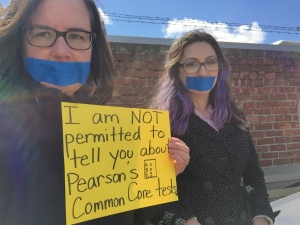KASICH: NOT TAKING SIDES MEANS HE'S JUST ANOTHER COWARDLY COMPROMISER;
SUPPORTS AMNESTY FOR ILLEGALS, COMMON CORE & GAY RIGHTS IN NORTH CAROLINA & NOW MISSISSIPPI
"IN OUR STATE (OHIO),
WE'RE NOT FACING THIS" (AMONG OTHERS)
HE WOULD AVOID "POLARIZATION" BETWEEN PEOPLE OF FAITH & GAYS
ANOTHER ARLEN SPECTER???
MORAL RELATIVIST FLIP FLOPS ON POLITICAL & MORAL ISSUES, WIVES & RELIGIONS. WHAT WOULD HE DO AS PRESIDENT?
QUOTE FROM WIKIPEDIA: https://en.wikipedia.org/wiki/John_Kasich
"Kasich has been married twice. His first marriage was to Mary Lee Griffith from 1975 to 1980, and they had no children. Griffith has campaigned for Kasich since their divorce. Kasich and his current wife, Karen Waldbillig, a former public relations executive, were married in March 1997 and have twin daughters, Emma and Reese.
Kasich was raised a Catholic, but considers denominations irrelevant, and stated that "there's always going to be a part of me that considers myself a Catholic." He drifted away from his religion as an adult, but came to embrace an Anglican faith after both his parents were killed in a car crash by a drunk driver on August 20, 1987. Kasich has said he "doesn't find God in church" but does belong to the St. Augustine church in Westerville, Ohio, which is part of the Anglican Church in North America, a conservative church that broke off from the Episcopal Church."
KASICH CONDEMNS MISSISSIPPI'S
RELIGIOUS FREEDOM LAW:
"WHAT THE [EXPLETIVE] ARE WE DOING?"
BY HEATHER CLARK
republished below in full unedited for informational, educational, and research purposes:
NEW YORK — Republican presidential candidate John Kasich condemned Mississippi’s religious freedom law this week, just a day after telling reporters that he would not have signed North Carolina’s “bathroom bill” requiring residents to use the restroom that correlates with their biological gender in government buildings.“I read about this thing they did in Mississippi, where apparently you can deny somebody service because they’re gay,” Kasich stated during a town hall event in New York, which was hosted by CNN. “What the H*ll are we doing in this country?”“I mean, look, I may not appreciate a certain lifestyle or even approve of it, but it doesn’t mean I’ve got to go write a law and try to figure out how to have another wedge issue,” he said.As previously reported, just last month, Kasich had backtracked remarks that some interpreted as suggesting that businesses should have to agree to forms of participation in events that conflict with their religious convictions.“[I]f they ask you to participate in something you really don’t like, that’s a whole other issue. Okay? Another issue,” he said during the Fox presidential debate in Detroit on March 3. “If you go to a photographer to take pictures at your wedding and he says, ‘I’d rather not do it,’ find another photographer. Don’t sue them in court.”Kasich said at that time that if people of faith are being forced to participate in something that conflicts with their convictions, then laws should be crafted to protect them—if necessary.“At the end of the day, if somebody’s being pressured to participate in something that is against their deeply held religious beliefs, then we’re going to have to think about dealing with a law,” Kasich outlined. “But you know what? I’d rather people figure this out without having to put another law on the books and have more arguments in this country.”Kasich’s previous “if you’re a cupcake maker and somebody wants a cupcake, make them a cupcake” remarks had drawn criticism, as some stated that he was making false assertions as no businesses are declining to serve homosexuals—that current legal battles are over personal participation in an event, not providing general service.The Mississippi bill that Kasich condemned on Monday likewise refers only to forms of participation in marital events, and does not permit the refusal of service in general. It prohibits the government from punishing those who pass up particular events for religious reasons.“The state government shall not take any discriminatory action against a person wholly or partially on the basis that the person has provided or declined to provide … services, accommodations, facilities, goods, or privileges for a purpose related to the solemnization, formation, celebration, or recognition of any marriage, based upon or in a manner consistent with a sincerely held religious belief or moral conviction,” the Protecting Freedom of Conscience from Government Discrimination Act reads in part.As previously reported, the bill also bans the government from punishing those whose policies require use of locker and restrooms consistent with their biological gender.On Sunday, Kasich told CBS’ “Face the Nation” that he wouldn’t have signed North Carolina’s “bathroom bill” into law either.“I believe that religious institutions ought to be protected and be able to be in a position of where they can live out their deeply held religious purposes. But when you get beyond that, it gets to be a tricky issue. And tricky is not the right word, but it can become a contentious issue,” he said.“Why do we have to write a law every time we turn around in this country? Can’t we figure out just how to get along a little bit better and respect one another? I mean that’s where I think we ought to be. Everybody chill out. Get over it if you have a disagreement with somebody,” Kasich said. “Unless there’s something that pops up, I’m not inclined to sign anything.”_______________________________________________________John Kasich: Accept Men in Women’s Bathrooms, Boys Showering With Girls?
Published on Apr 15, 2016John Kasich may be the most pro-amnesty Republican running for president, but now we learn he’s also pro something else: having men in women’s bathrooms and boys showering with girls. This is apparently the case as the Ohio governor recently stated he “‘wouldn’t have signed” the recent North Carolina “bathroom bill.” - http://www.thenewamerican.com/usnews/...

